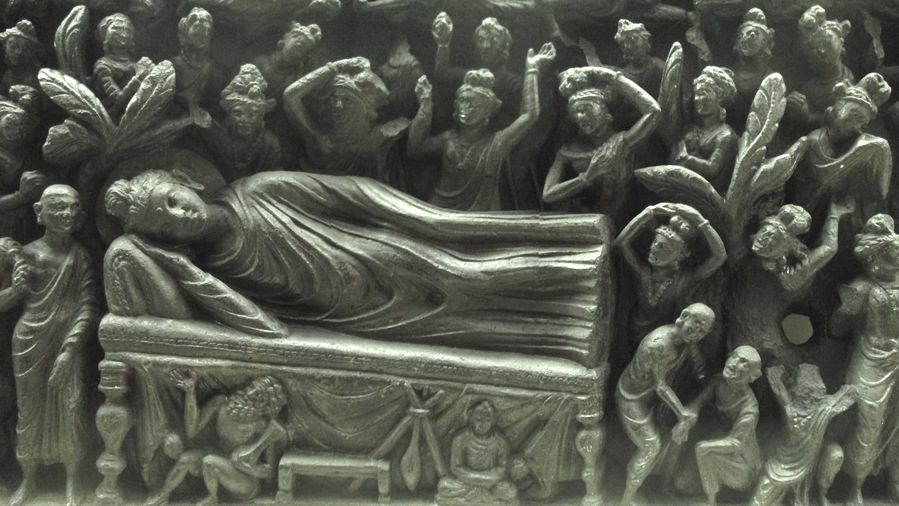[Note: This short excerpt from this much longer sutta beings with the Buddha going into and out of successively deeper states of meditation.]
…Then the Buddha entered the first absorption. Emerging from that, he entered the second absorption. Emerging from that, he successively entered into and emerged from the third absorption, the fourth absorption, the dimension of infinite space, the dimension of infinite consciousness, the dimension of nothingness, and the dimension of neither perception nor non-perception. Then he entered the cessation of perception and feeling.
Then Venerable Ānanda said to Venerable Anuruddha, “Venerable Anuruddha, has the Buddha become fully extinguished?”
“No, Reverend Ānanda. He has entered the cessation of perception and feeling.”
Then the Buddha emerged from the cessation of perception and feeling and entered the dimension of neither perception nor non-perception. Emerging from that, he successively entered into and emerged from the dimension of nothingness, the dimension of infinite consciousness, the dimension of infinite space, the fourth absorption, the third absorption, the second absorption, and the first absorption. Emerging from that, he successively entered into and emerged from the second absorption and the third absorption. Then he entered the fourth absorption. Emerging from that the Buddha immediately became fully extinguished.
When the Buddha became fully extinguished, along with the full extinguishment there was a great earthquake, awe-inspiring and hair-raising, and thunder cracked the sky. When the Buddha became fully extinguished, Brahmā Sahampati recited this verse:
“All creatures in this world
must lay down this bag of bones.
For even a Teacher such as this,
unrivaled in the world,
the Realized One, attained to power,
the Buddha became fully extinguished.”
When the Buddha became fully extinguished, Sakka, lord of gods, recited this verse:
“Oh! Conditions are impermanent,
their nature is to rise and fall;
having arisen, they cease;
their stilling is true bliss.”
When the Buddha became fully extinguished, Venerable Anuruddha recited this verse:
“There was no more breathing
for the poised one of steady heart.
Imperturbable, committed to peace,
the sage has done his time.
He put up with painful feelings
without flinching.
The liberation of his heart
was like the extinguishing of a lamp.”
When the Buddha became fully extinguished, Venerable Ānanda recited this verse:
“Then there was terror!
Then they had goosebumps!
When the Buddha, endowed with all fine qualities,
became fully extinguished.”
When the Buddha became fully extinguished, some of the mendicants there, with arms raised, falling down like their feet were chopped off, rolling back and forth, lamented: “Too soon the Blessed One has become fully extinguished! Too soon the Holy One has become fully extinguished! Too soon the seer has vanished from the world!” But the mendicants who were free of desire endured, mindful and aware, thinking, “Conditions are impermanent. How could it possibly be otherwise?”
Then Anuruddha addressed the mendicants: “Enough, reverends, do not grieve or lament. Did the Buddha not prepare us for this when he explained that we must be parted and separated from all we hold dear and beloved? How could it possibly be so that what is born, created, conditioned, and liable to wear out should not wear out? The deities are complaining.”
“But sir, what kind of deities are you thinking of?”
“There are, Ānanda, deities—both in the sky and on the earth—who are percipient of the earth. With hair disheveled and arms raised, they fall down like their feet were chopped off, rolling back and forth, lamenting: ‘Too soon the Blessed One has become fully extinguished! Too soon the Holy One has become fully extinguished! Too soon the seer has vanished from the world!’ But the deities who are free of desire endure, mindful and aware, thinking: ‘Conditions are impermanent. How could it possibly be otherwise?’”
Ānanda and Anuruddha spent the rest of the night talking about Dhamma.…
Read the entire translation of Dīgha Nikāya 16 Mahāparinibbānasutta: The Great Discourse on the Buddha’s Extinguishment by Bhikkhu Sujato on SuttaCentral.net.Or read a different translation on DhammaTalks.org, Ancient-Buddhist-Texts.net or AccessToInsight.org. Or listen on PaliAudio.com or SC-Voice.net. Or explore the Pali on DigitalPaliReader.online.
Or read a translation in Deutsch, Srpski, বাংলা, Čeština, Español, Français, עִבְֿרִיתּ, हिन्दी, Magyar, Bahasa Indonesia, Italiano, 日本語, ಕನ್ನಡ, မြန်မာဘာသာ, Nederlands, Norsk, Português, Română, Русский, සිංහල, Slovenščina, Svenska, ไทย, Tiếng Việt, or 汉语. Learn how to find your language.































